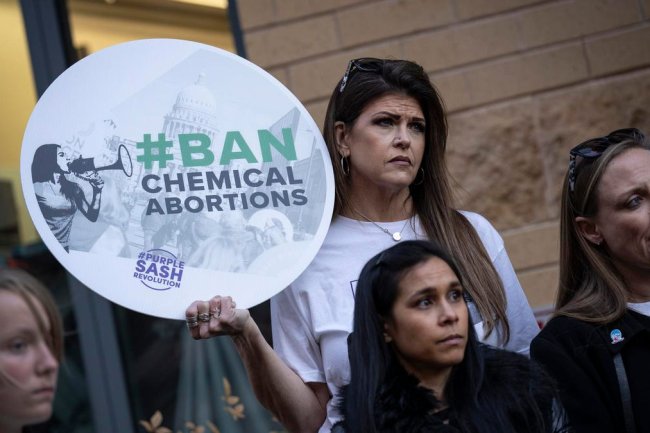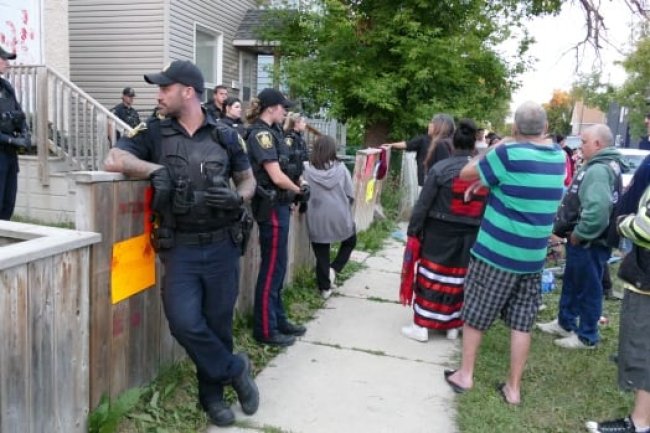This 21-year-old has yet to grieve her mother — the fight for Indigenous women and girls can't wait
Cambria Harris, daughter of Morgan Harris, has been calling for a search of the Prairie Green Landfill where it's believed her mother's remains were dumped earlier this year. (Jeff Stapleton/CBC)WARNING: This story contains distressing details.Cambria Harris hasn't had the chance to grieve the loss of her mother. The 21-year-old woman has been too busy fighting for action for missing and murdered Indigenous women and girls.She hasn't stopped since she found out two weeks ago that her mom, 39-year-old Morgan Harris, was one of four Indigenous women Winnipeg police believe were killed by Jeremy Skibicki. "I'm just angry," said Harris. "I want justice brought to these women."Left to right: Morgan Beatrice Harris, Marcedes Myran and Rebecca Contois. Winnipeg police said on Thursday, Dec. 1, 2022, they have charged Jeremy Skibicki with first-degree murder in the deaths of all three women, as well as a fourth, whom community members have named Buffalo Woman, because police do not know her i


WARNING: This story contains distressing details.
Cambria Harris hasn't had the chance to grieve the loss of her mother.
The 21-year-old woman has been too busy fighting for action for missing and murdered Indigenous women and girls.
She hasn't stopped since she found out two weeks ago that her mom, 39-year-old Morgan Harris, was one of four Indigenous women Winnipeg police believe were killed by Jeremy Skibicki.
"I'm just angry," said Harris. "I want justice brought to these women."

It's not the first time Harris has found herself calling for justice for Indigenous women and girls in Canada.
When 15-year-old Tina Fontaine's body was found in the Red River in 2014, Harris marched in Winnipeg's North End holding a sign reading "I will not be next."
She was 13 years old.
"What I meant by that was I don't want to be another missing and murdered Indigenous woman on a missing persons poster," said Harris.
"Year after year we see hundreds of them scattered across billboards in the city and nobody blinks an eye, and then when we're found society just kind of watches, and then they cry and they grieve, and then they forget about us until the next story. And we're not a story, we're people."
"You see the women going [missing] left and right, so why can't you see that this is an ongoing crisis when it's right in front of you."

What Harris couldn't have known in 2014 was that eight years later she would be at a vigil for her own mother, now also a victim of homicide.
WATCH | 'I will not be next': Cambria Harris reflects on a poster she held at a 2014 march:
This time, her fight for justice led her to Ottawa, where in many ways she's become the face of a decades-long movement to protect the safety of Indigenous women.
"I'm honoured to be able to say I can speak my voice on behalf of all these other women," she said.
Nine known Indigenous women have been killed in Winnipeg so far in 2022, and that total grows to 10 including Mashkode Bizhiki'ikwe, or Buffalo Woman — the name given to an Indigenous woman whose identity is otherwise unknown and who police allege was also killed by Skibicki.
Talking to Trudeau
While in Ottawa, Cambria and her younger sister Kera Harris demanded a search of the Prairie Green landfill north of Winnipeg, where it's believed the remains of both her mother and Marcedes Myran were dumped earlier this year.
They called for Winnipeg police Chief Danny Smyth to resign following a decision not to search the landfill — something police said would be too difficult.
The sisters also met with politicians, including Prime Minister Justin Trudeau.
"He said to us 'I'm so sorry, my condolences, my heart goes out to you and I'm sad that we have to meet under circumstances like this and it shouldn't have to be like this,'" said Harris.
"I called Trudeau out and I said 'No we shouldn't, but a search needs to get done and we need to look for these women and bring them home.'"
It's something Harris told CBC she'd do herself if she could.
While circumstances might be different at Prairie Green, previous landfill searches for human remains have been successful in Utah, Oregon and South Carolina.
"If I had the chance to go into that landfill myself, I would. Like, give me a shovel, I'll start digging," Harris said in an interview with CBC.
"I know it's not easy and I know it's dangerous but I've asked repeatedly, give me the [protective] suits, tell me the plan. I'll do it. I'll get in there."
WATCH | Daughter of slain woman angry that onus is on Indigenous families to advocate for MMIWG:
Late Wednesday, Assembly of Manitoba Chiefs Grand Chief Cathy Merrick told CBC the federal government had agreed to cover costs of a feasibility study to determine what would be needed to conduct a search at Prairie Green landfill.
CBC News has reached out to Crown-Indigenous Relations Minister Marc Miller for comment but didn't immediately receive a response.
Merrick said Harris and her sister have moved this issue forward.
"They really pushed the fact that we needed to do the work," said Merrick.
Remembering her life
While Harris waits to find out what will come next, she said she wants her mom to be remembered for who she was, not just how she died.
One memory she holds is her mom's favourite song: Savage Garden's Truly Madly Deeply.
"It's a love song, but she used to sing it, like, in love of her kids, and so that's what I think is really sweet," said Harris.
Harris lived with her mom until the age of six. She remembers coming home from a sleepover to see police at the house.
"I wasn't allowed to see my mom and she screamed at me from the door that she loved me and that she would get me back," said Harris. "I probably didn't see her for a few years after that."
Harris was part of the child welfare system until she was 17. She said she watched her mother struggle with addiction, mental health issues and homelessness after she lost custody of her children.
She believes her mother was failed by government systems.
"She just fell through the cracks," said Harris. "She was in and out of treatment centres and homeless centres repeatedly trying to get help, and she spent her life on the streets fighting to survive, and she lived in fear."
It wasn't easy to see, and as a child she didn't have a way to help, said Harris.
"I always wondered about my mother," she said.
"Whenever the weather got cold, whenever it rained, I always prayed that she was safe and that she had somewhere warm."

Harris is now a mom to a two-year-old daughter. She said her own life has had its challenges.
"I went though all the forms of trauma," said Harris. "I probably spent a year-and-a-half of my life just in shelters, I probably spent eight months in a group home and a very dangerous one at that, where you can't even really leave your room."
She knows changes can't come overnight, but said there needs to be more safe spaces for women, more support for the homeless and faster access to addictions services.
She plans to keep advocating for missing and murdered Indigenous women.
"Everything I'm doing right now is for my mother, all missing and murdered Indigenous women.… I'm doing it for my daughter, I'm doing it for the next generations that come after this."
Support is available for anyone affected by details of this case. If you require support, you can contact Ka Ni Kanichihk's Medicine Bear Counselling, Support and Elder Services at 204-594-6500, ext. 102 or 104, (within Winnipeg) or 1-888-953-5264 (outside Winnipeg).
Support is also available via Manitoba Keewatinowi Okimakanak's Missing and Murdered Indigenous Women and Girls Liaison unit at 1-800-442-0488 or 204-677-1648.
What's Your Reaction?




















